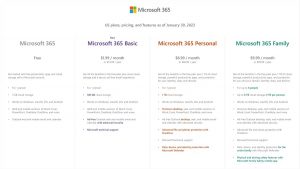
On January 30, Microsoft will introduce a brand-new, lower-cost tier of Microsoft 365, its product family of productivity software, collaboration tools, and cloud-based services. Microsoft 365 Basic, priced at $1.99 per month or $19.99 per year, will initially include 100 GB of storage, Outlook email, and access to Microsoft 365 and Windows 11 support experts.
Starting January 30, existing OneDrive 100 GB subscribers will be transitioned to Microsoft 365 Basic. The Microsoft 365 Basic plan will soon include “advanced security features” like ransomware recovery and password-protected sharing links.
Microsoft 365 Basic does not replace Microsoft 365 Free. This is here to stay, along with the same benefits it offers today, such as web-based Word, Excel, PowerPoint, OneNote, Outlook, OneDrive, Clipchamp, and more, and 5 GB of cloud storage. As for Microsoft 365 Personal, it will remain $6.99 per month or $69.99 per year.

Compared to Google Workspace’s Individual plan, Microsoft 365 Basic offers 1 TB of storage, professional support, and Google’s productivity software (e.g. Google Drive, Calendar, Meet, and Gmail). Zoho’s Standard Workplace plan, which tops out at 10 GB of storage and costs $3 per user per month billed annually, is also cheaper.
Along with the introduction of the upgraded tier, Microsoft today announced the general availability of the Microsoft 365 app. It replaces the Microsoft Office app with a new design and enhanced features. Microsoft 365 offers quick access to apps including Word, Excel, and PowerPoint, along with file templates, “smart” recommendations, to-do list functionality, and syncing across devices, as previewed during Microsoft’s Ignite conference earlier this year. The app is now live on the web.
Microsoft says its 365 app will launch later this month on Windows, Android, and iOS.
Additionally, Microsoft 365 users will soon be able to view, manage, and upgrade cloud storage across devices via a new “simplified view,” according to the company. Subscribers will be able to manage and upgrade their cloud file and photo storage starting February 1.
It makes sense to invest in Microsoft 365. As Microsoft has bet much of its future on the cloud and, by extension, cloud-driven subscriptions, it is one of its fastest-growing revenue items. On its Q4 2022 earnings call, Microsoft reported that Microsoft 365 Consumer subscribers increased 15% to 59.7 million, driving revenue in its Office Consumer products and cloud services segment to $136 million – a 9% increase year over year.
There may be legal trouble brewing over Microsoft 365 in the European Union. Here is where my colleague Natasha Lomas reports. According to this assessment, Microsoft was not able to resolve any of the compliance issues they had raised with it. Microsoft 365 customers in Germany and elsewhere in the European Union may be pressured to reassess their use of Microsoft’s software and/or find alternatives that are less compliance-challenging.

